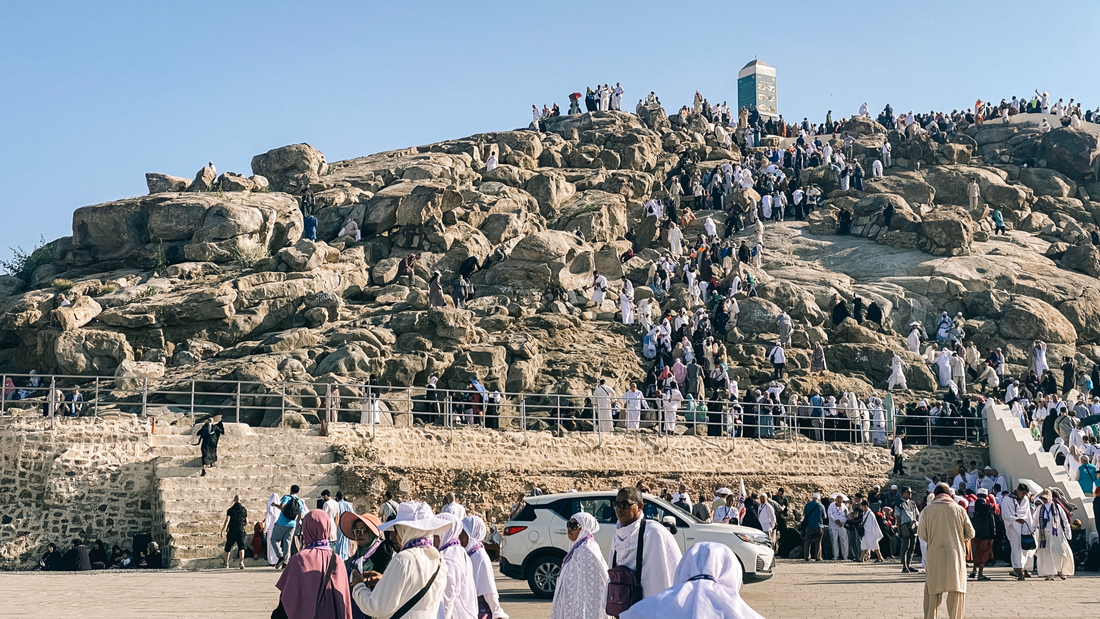
Top 10 Common Problems Faced by Hajis During Hajj and How to Avoid Them
Share
Hajj, one of the five pillars of Islam, is a once-in-a-lifetime journey for most Muslims. It is a sacred spiritual experience filled with reward, but it also comes with several challenges. Proper planning and awareness can significantly reduce the difficulties faced by Hajis. Below, we discuss the top 10 problems faced during Hajj and practical tips on how to avoid them.
1. Overcrowding and Stampedes
Millions gather annually in Makkah for Hajj, making overcrowding one of the biggest safety risks. From Tawaf around the Kaaba to the stoning at Jamarat, the sheer number of people increases the risk of stampedes.
How to Avoid:
- Follow the guidance and timings given by your Hajj group.
-
Avoid peak hours for rituals
- Stay alert, avoid pushing, and help others maintain calm.
- Wear a distinct ID badge to avoid getting lost in crowds.
2. Heat Stroke and Dehydration
Hajj is often performed during extremely hot months in Saudi Arabia. With long hours of walking and standing under the sun, heat stroke and dehydration are common.
How to Avoid:
- Carry a water bottle and stay hydrated at all times.
- Use an umbrella or cap and wear breathable white cotton clothing.
- Take breaks in shaded areas or under tents.
- Use cooling towels or sprays.
3. Illness and Fatigue
The dense gathering of people from all around the world increases the risk of infection and fatigue. Flu, sore throat, and food poisoning are frequent complaints.
How to Avoid:
- Get vaccinated before travel as recommended.
- Carry a basic first aid kit and personal hygiene items.
- Wear a face mask in crowded areas.
- Get sufficient rest between rituals.
4. Lost Belongings and Luggage Misplacement
Many Hajis report missing or misplaced luggage, especially when traveling between cities or returning from Hajj.
How to Avoid:
- Use labeled, lockable suitcases and carry important items in a personal backpack.
- Use bright luggage tags for easy identification.
-
Take pictures of your belongings before the trip.
- Keep valuables and necessary documents on your person at all times.
5. Lack of Proper Accommodation and Food
Many first-time Hajis are shocked by poor-quality food or overcrowded accommodations due to travel agencies over-promising and under-delivering.
How to Avoid:
-
Research and book Hajj packages from licensed, well-reviewed providers.
-
Contact previous customers for reviews.
-
Keep simple snacks and energy bars with you.
- Choose hotel packages near Haram if mobility is an issue.
6. Navigation and Getting Lost
Due to the complex layouts of Mina, Arafat, and Muzdalifah, Hajis often get separated from their groups and find it hard to find their tents or guides.
How to Avoid:
-
Memorize landmarks and tent numbers.
-
Stick with your group and have a buddy system.
-
Keep a charged mobile phone with a local SIM or roaming.
- Download offline maps of the holy sites.
7. Financial Scams and Overcharging
Overcharging tourists is common among taxi drivers and small vendors. Some fake travel agents even run Hajj scams.
How to Avoid:
-
Always carry some local currency, but avoid large amounts of cash.
-
Only deal with authorized and approved agencies.
-
Keep a list of emergency contacts, including your consulate.
- Use e-wallets or debit cards if available and accepted.
8. Inadequate Knowledge of Rituals
Improper performance of rituals due to a lack of education or guidance can nullify or reduce the reward of Hajj.
How to Avoid:
-
Attend Hajj training programs in your local mosque or online.
-
Carry a step-by-step Hajj guide or app.
-
Follow the scholars and guides who are part of your group.
- Ask questions freely—Hajj is not the time to hesitate.
9. Mental Stress and Anxiety
For many, the idea of managing rituals, physical stress, and large crowds brings emotional stress and spiritual anxiety.
How to Avoid:
-
Practice patience and focus on the spiritual significance of every moment.
-
Meditate, do dhikr (remembrance of Allah), and rest well.
-
Keep a diary to reflect on your journey.
-
Stay connected with your group for emotional support.
10. Insufficient Gifts for Loved Ones After Hajj
It is a tradition for Hajis to bring back gifts like Zam Zam water, Ajwa dates, tasbeehs, and other Islamic souvenirs. But many return and realize they didn’t bring enough, or their luggage was lost or tampered with, especially at airports.
How to Avoid:
-
Pre-order gifts from trusted Islamic online stores with delivery in Pakistan.
-
Pack Zam Zam and dates securely in airline-approved packaging.
-
Use services like Al Madni Traders to ensure timely and authentic Hajj gift delivery even before you return home.
Seamless Islamic Gifting with Al Madni Traders
We understand the significance of Hajj gifts, and we offer a range of premium-quality Zam Zam water, Ajwa dates from Madinah, tasbeehs, and Islamic gift packs specially curated for returning Hajis. With nationwide delivery, secure packaging, and authentic products, Al Madni Traders is the perfect solution for those looking to share their Hajj blessings with loved ones. Explore our Hajj gift bundles today and make sure you never return home empty-handed.
Conclusion
Hajj is a beautiful yet demanding journey. While no one can eliminate every challenge, being aware of the most common problems and taking preventive measures will ensure that your pilgrimage is safe, fulfilling, and spiritually rewarding. Always choose reliability, preparation, and guidance over assumptions and shortcuts.
